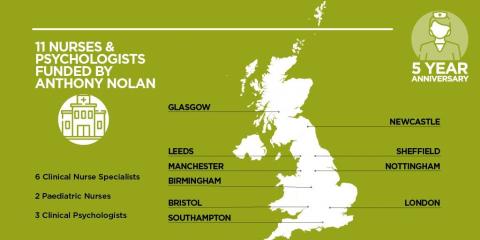This October, we’re celebrating five years since Anthony Nolan established its first Clinical Nurse Specialist (CNS) post to provide people with expert care, information and support before and after a stem cell transplant. To mark the occasion, we caught up with Hayley Leonard, the first person to take on the role and drive Anthony Nolan’s lifesaving work.
How did you first become an Anthony Nolan Clinical Nurse Specialist (CNS)?
I worked in hospitals since I was 16 and had wanted to work as a cancer nurse at a top hospital. The Royal Marsden is known worldwide, so I was glad to not just become a senior nurse there but fall into an area I grew to love – haematology. Over time, I became more interested in the science behind the HLA typing, the matching. I love it. I’m a bit of a geek!
In 2017, I joined Anthony Nolan as Lead Nurse. It was new and unknown initially. The role is all about working with and developing the network of Clinical Nurse Specialists and building links with the Transplant Centres. I also provide education events for healthcare professionals. There are many challenges for our clinical teams, so bringing people together and discussing these challenges has been an important part of the job.
What makes working at Anthony Nolan different and what do you like about your role?
It is a lovely place to work. It’s positive and open to ideas. I’m working with people in a highly complex area. Every patient is slightly different, with different pathways. Being with people on a journey, you get to know people really well. Leaving the NHS was a big decision, but this has been an opportunity to work with other nurses, and medical teams to improve patient care on a bigger scale.
What difference do you think dedicated Anthony Nolan healthcare professionals make to patients and families?
It’s always about them having someone to contact. When patients don’t have a dedicated Clinical Nurse Specialist to call, they talk about falling off a cliff. Nurses provide that support. You can be at home, unsure what the consultant said, or not feeling well, you can ring any CNS – and get that answer. It’s hugely important.
And there is no end to that support. If they’re seven years post-transplant, they still get the same service. You’re not discharged. Even patients that are doing well, if they have a question, they can just pick up the phone and call .
We have to remember that this is a rare treatment. It’s hard to expect GPs, nurses and other areas to understand some of the complications of transplant. Education is huge. From discharge to late-effects, the nurses educate patients and families about what’s normal and what’s not, and when they should call someone. We want to empower them and save them the anxiety of going to the hospital.
Are there any patient stories that stand out to you?
One story that stands out is a patient I cared for with social and psychological needs. He wasn’t able to feed himself. Transplant teams are brilliant for physical stuff like bloods and Graft-versus-host disease but only concentrate on the medical side. If my role wasn’t there, who would have done that for him? Because I supported him early on, we got social services involved.
I also cared for a young man who had a tough time. He later invited me to his wedding, and he’s doing very well. I was genuinely really touched that I was invited. It was very kind.
What are you most excited about doing in the future?
Research! Our nurses are collecting data on people’s quality of life and we’re very fortunate to now have a Research Coordinator so we can analyse it. The hope is that if we can identify patient concerns or themes in the data, we can share that knowledge and help implement interventions and services. It’s another example of Anthony Nolan giving extra. There’s a real link between supporting clinical work and research. I’m excited about that.
Ultimately, we want to improve people’s quality of life. When I started nursing, the only focus was keeping people alive. That’s changed, and rightly so. We want people to achieve everything they would have if they hadn’t had a transplant, with our support. There is no point in having this lifesaving treatment if you don’t have a good quality of life. It is about saving more lives and people living the lives they want to lead.
And finally… who or what inspires you to do such an amazing job?
I’m always inspired by patients. When you’re sitting with patients who are going through a challenging time, I always want to do a better job for them. I think nurses naturally do that. We want to make people better.
I’m also inspired by the other nurses and psychologists at Anthony Nolan. It’s lovely to work with people who are passionate and likeminded about what we want to achieve. Talking to many nurses nationwide, I’m also inspired by them because we all want to make a change and make it better. I realise that sounds cheesy but that is the honest answer.
And last but not least, all of Anthony Nolan’s supporters. However they’re involved with the charity, they are so passionate. How can I not be inspired?! They constantly remind me that if you want to do something, do it. If you want to change something, change it. Don’t sit and talk about it. Get up and do it!
To find out more about our Clinical Nurse Specialists and the transplant centres where they are based, visit anthonynolan.org/patients-and-families/get-support-us/clinical-nurse-specialists
